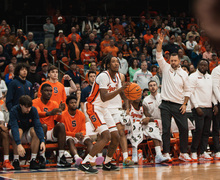Six months later, students remember backlash from Stop Online Piracy Act
Last winter, it was hard to go anywhere on the Internet without hearing about the impending Stop Online Piracy Act. Internet users spoke out against the act in several ways: Forums debated it, and newspapers and blogs wrote about it, predicting what would happen if such an act would pass.
Copyright infringements would increase as websites such as Facebook and YouTube would alter their security to fit a possible SOPA crackdown.
Six months later, the issue is still highly contested.
SOPA threatened to pass in January, so an estimated 7,000 websites, like the English Wikipedia, reddit and WordPress, decided to “black out” for 24 hours to protest SOPA on January 18 to bring awareness to SOPA’s possible passing. Among the websites that chose to black out was Syracuse University’s School of Information Studies webpage, the only higher education institute in the nation to officially “black out” against SOPA.
Ashley Aron, a sophomore in the Bandier Program for Music and the Entertainment Industries, had conflicting thoughts about the possibility of the act. She said that while freedoms of speech and expression are important, so is battling illegal downloading.
“I wouldn’t want someone illegally downloading music and cheating these artists out of credit. Personally, I don’t want any of it to happen,” she said.
Christina Fieni, a junior advertising and information technology dual major, was concerned when she found out cover artists would be threatened under the law.
“People like Justin Bieber had been discovered by covering songs on the Internet and on YouTube. I’m an advocate for free speech, and this was something that needed to be protected because the Internet is so vast,” she said.
Fieni was taking a networking class at the time and was told about the blackout from her professor.
“It was great to know that it was the only higher education that participated in the blackout of SOPA and that we were a part of this movement,” Fieni said.
Leslie Berkowitz, a senior television, radio and film major, also heard about the SOPA blackout while in class. She was in London, where she had been studying abroad, when she heard the news about the iSchool blackout.
“I think it’s awesome that the iSchool did this,” she said. “We have such a big social media presence and it was great to see not only were we on top of the news, but we were taking a stance on it as well.”
But, six months later, the ambiguity remains. Even though SOPA did not pass through and become a law, there is a possibility that people are still feeling a little pressure to watch themselves and what they download, in case something like SOPA is to pass in the future.
“I think that, because it was shot down and that there was such a vocal protest against it, I feel like I wouldn’t be in any particular jeopardy of being caught. If they would go after someone, it would be someone bigger than me,” Berkowitz said.
Two days after the blackout, the House of Representatives voted to postpone consideration for the bill, and it has yet to come up again for a vote. SOPA has been halted for now.
Some students, like Anthony Mormile, a sophomore television, radio and film major, supported parts of the act, yet thought it was flawed.
Said Mormile: “I am in support of certain parts of an act like that, but with something like the Internet, it needs a system of checks and balances. I am a big advocate of Pandora, where you get the content for free legally.”
Published on September 17, 2012 at 11:55 pm
Contact Hannah: hrtibbet@syr.edu





